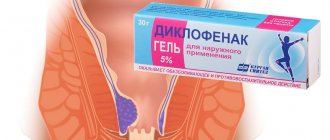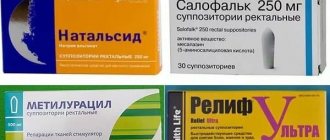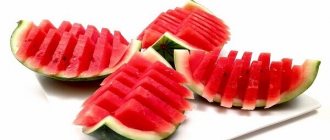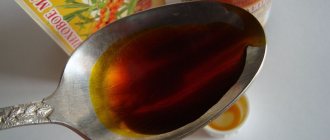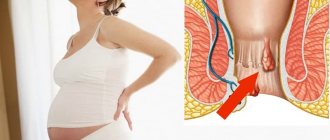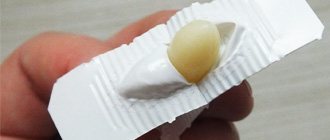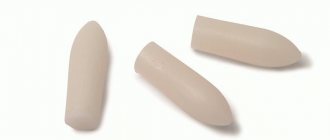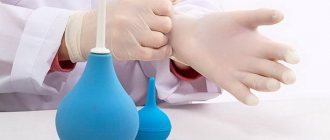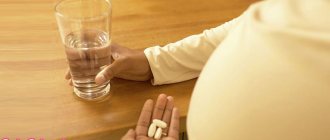Suppositories for proctitis are effective means that help eliminate the cause of inflammation and heal the resulting wounds in the rectum. The drugs must have complex properties and be safe for rectal use.
The use of rectal suppositories depends on the severity of the pathology. In some cases, surgery is required to achieve a complete recovery. The drugs have different properties that are used in the treatment of various forms of the disease.
What candles are used, list
Before considering the main drugs in the form of suppositories for the treatment of proctitis, it is necessary to study the main causes of the development of the disease:
- entry into the rectum of infections (staphylococci, streptococci, gonococci), which are absorbed into the general bloodstream and cause inflammation. In the treatment of this form, suppositories containing antibiotics are effective;
- damage to the rectum for various reasons (frequent anal sex, hemorrhoids, eating rough food, swallowing small objects). For recovery, suppositories with a wound-healing effect are used;
- poor nutrition (excessive consumption of salty, spicy, smoked foods) requires strict adherence to the diet as a preventive measure;
- the presence of diseases of the gastrointestinal tract (hepatitis, cholecystitis, pancreatitis, cystitis, gastritis). In this case, treatment of the resulting pathologies is required;
- the development of oncological processes in the body that require individual treatment in a strictly established scheme.
Sea buckthorn rectal suppositories
The main indication for the use of rectal suppositories is the treatment of inflamed rectal mucosa. The active components of the composition gently envelop the affected area and promote rapid healing of ulcerative manifestations.
Sea buckthorn improves blood circulation and metabolism, which has a beneficial effect on the healing of damaged mucous membranes. Application consists of preliminary bowel movement and insertion of a suppository into the anus. After use, you must take a lying position for 20 minutes to prevent the drug from leaking out.
Sea buckthorn suppositories have a natural composition, but their use during pregnancy and breastfeeding must be agreed with your doctor. The medicine is in demand among consumers due to its pronounced effectiveness.
Salofalk
An effective drug for the treatment of the acute stage of proctitis. After using the medicine, there is a slowdown in the activity of phagocytes, which ensures the elimination of swelling, redness and severe pain.
Suppositories are prescribed in a dosage of 2-3 pieces per day for acute syndrome. If necessary, the course of treatment is repeated. The medicine is not recommended for serious problems with the liver, kidneys, hemorrhoids, or for children under 2 years of age.
Currently reading: Symptoms, prognosis and treatment methods for ulcerative proctitis
Relief
One of the effective drugs in the form of rectal suppositories and ointments. The active ingredients (shark liver) of natural origin in the composition relieve itching, pain and swelling with severe symptoms of proctitis.
The medicine eliminates severe bleeding from ulcerative colitis. The dosage is 4 suppositories per day until obvious signs of improvement occur. The drug has virtually no contraindications or side effects, which is its advantage.
Propolis based suppositories
Rectal suppositories for the treatment of proctitis of natural origin containing propolis and cocoa extract. These ingredients in combination have a pronounced analgesic and anti-inflammatory effect.
The medicine has a number of useful properties:
- antibacterial and antioxidant effects;
- obtaining an antihistamine effect;
- increased phagocytosis activity;
- elimination of swelling.
The suppository is administered immediately before bedtime, since the active substances are well absorbed into the general bloodstream and begin to act after 20–40 minutes. The drug is not recommended for individuals intolerant to propolis.
Potato candles
A folk remedy used in the treatment of proctitis. The starch in potatoes promotes the healing of formed wounds and eliminates unpleasant pain. The vegetable is used in chopped and portioned form.
The cooking recipe is based on cutting potatoes into the shape of an oblong candle or applying a compress from crushed raw materials. It is preferable to use the product before bedtime, since a more pronounced effect can be obtained over a long period of time.
Proctosan
Anti-inflammatory drug in the form of rectal suppositories. The active substance provides the basic properties of the medicine. Moreover, the product has no obvious contraindications or side effects. The course of therapy is prescribed by the attending physician depending on the degree of damage to the rectum.
The best suppositories to eliminate the disease
We present a list of the most popular rectal agents used to treat the disease:
- Sea buckthorn oil suppositories are inexpensive and effective; they help with inflammation, as the active substance has regenerating properties. The drug is used without interruption for no more than two weeks, then re-treatment is possible after 1-1.5 months. Can be used from the age of six. Children under 14 years of age are prescribed one suppository per day, and adults - one suppository twice a day. The product is introduced into the anus after bowel movements and hygiene procedures.
- "Relief" is one of the most effective drugs used for hemorrhoids and proctitis. The active ingredient is phenylephrine. It is an alpha-adrenergic agonist with a vasoconstrictor effect. The product removes swelling and reduces exudation. Suitable for symptomatic treatment of proctological diseases. “Relief” also consists of shark liver oil, which has a positive effect on the speed of reparative processes, which promotes the healing of damaged anal tissue. Suppositories are inserted deep into the rectum, previously cleared of feces, twice a day. Before use, hygiene procedures must be carried out.
- "Salofalk" is a medicine based on mesalazine. The component has anti-inflammatory properties and antibacterial activity. It is prescribed if proctitis has developed against the background of an infectious intestinal lesion. Depending on the form of release, the drug is administered rectally three times a day, 1-2 pieces (a dosage of 250 mg requires two suppositories, and one for 500 mg). The duration of use is determined individually. "Salofalk" is administered after the act of defecation and hygiene procedures.
- Suppositories with propolis are a cheap herbal-based medicine with a wide therapeutic spectrum of action. The medicine relieves inflammation and irritation of the rectum, has healing and antiseptic properties. Suitable for complex treatment of infectious diseases. The medication is prescribed from the age of seven, one dose three times a day. The duration of therapy varies between 1-3 weeks depending on the severity of proctitis. Application is carried out as standard after bowel movements and hygiene.
- "Proctosan" is a medicine with complex action. It consists of several active components: bufexamac, bismuth subgallate, titanium dioxide and lidocaine hydrochloride. Bufexamak fights severe inflammation. Bismuth subgallate has wound healing properties. Titanium dioxide complements the effectiveness of the previous component, enhancing its reparative pharmacological effect. Lidocaine hydrochloride is a local anesthetic used to relieve severe pain. "Proctosan" is a good drug for the treatment of hemorrhoids and proctitis. Used for up to 1.5 weeks, one piece 2-3 times a day after bowel movements and hygiene.
- “Natalsid” is a medication prescribed for intestinal inflammation, if the disease is accompanied by hemorrhages. Similar conditions with proctitis are observed in the case of erosive etiology of the disease. The active ingredient in the composition is sodium alginate. It is a polysaccharide that has a hemostatic and restorative effect. It is of natural origin, as it is made from brown algae. The medication is administered twice a day, one piece after bowel movements and hygiene. Duration of therapy is up to two weeks.
- “Prednisolone” - these suppositories are prescribed in difficult situations, when the pain is unbearable, and inflammation has spread greatly in the lower intestines. The product effectively eliminates exudative processes. The active substance is a hormonal drug - a synthetic corticosteroid. The medication is characterized by rapid action and is suitable for prompt relief of the condition. Only one suppository of 100 mg is used per day. The duration of therapy should not exceed two days (for two suppositories).
After identifying the cause of the disease, the proctologist can prescribe other medications in the same release form . Examples of other trade names of drugs that can be used for proctitis: “Relief Pro”, “Relief Advance”, “Nigepan”, “Proctosedil”.
It can be useful:
Symptoms of proctitis and effective treatments
How to identify and treat radiation proctitis
Treatment of proctitis with folk remedies
Anti-inflammatory
Suppositories containing propolis have an antiseptic effect and actively destroy pathogenic microflora. Dissolving in the intestines, the fat base quickly delivers the medicinal composition to the site of inflammation. There are practically no restrictions on use, with the exception of patients with allergic reactions to bee products.
Suppositories with ichthyol activate blood circulation near the affected areas of the colon, which promotes tissue regeneration, relieving swelling and pain. Preparations with sea buckthorn or rosehip oil heal small wounds and cracks well and prevent the spread of bacterial infection.
Suppositories with methyluracil are widely used in the treatment of colitis and other intestinal diseases. They create a protective film on the mucous membrane, which prevents inflammation from spreading to healthy tissue.
Types of suppositories for proctitis
Rectal suppositories against inflammation of the rectum come in several types:
- regenerating;
- anti-inflammatory;
- painkillers;
- antibacterial or antiviral.
The first group of drugs is most often used if proctitis has already been practically cured and has not caused complications. Regenerating suppositories accelerate the division of epithelial cells, help quickly restore the intestinal mucosa, and heal small wounds.
Anti-inflammatory and analgesic suppositories are used to treat proctitis of a non-infectious nature, that is, which arose due to damage to the mucous membrane. These drugs fight local inflammation and relieve pain.
If proctitis is caused by an infection or it is added as a complication, then antibacterial or antiviral suppositories are used, depending on the nature of the microorganisms. Together with these drugs, it is necessary to take prebiotics, since the active substance can disrupt the composition of normal microflora.
Below are the names and brief descriptions of some of the drugs in each group. The information is given for informational purposes only; under no circumstances should you take them on your own without consulting a doctor.
Instructions for use
When administering rectal suppositories, unnecessary damage to the rectal mucosa is possible, therefore, before using suppositories, you must carefully study the instructions for use of the drugs in this form of release:
- carrying out preliminary preparation and bowel movement naturally or with the help of an enema. Preparations are opened preferentially before direct administration to prevent excessive contamination of bacteria on the surface of the suppository;
- mandatory hand washing before the procedure in accordance with personal hygiene standards;
- after opening the package, the suppository is dipped in cool water and inserted into the rectum, since this method allows you to soften the path of passage of the suppository and eliminate unnecessary trauma to the damaged mucosa;
- The insertion procedure is carried out while occupying a comfortable position (on your side or leaning forward). The suppository is inserted no deeper than 3 cm into the rectum and remains in a supine position for 1 or two hours. It is preferable to carry out the manipulation before bedtime.
Currently reading: Rectal proctitis
The use of rectal suppositories for the treatment of proctitis is carried out daily, on average 2-3 times a day until noticeable signs of improvement occur. This method is not recommended if there are obvious contraindications and side effects.
Classification
Pathology is classified according to severity:
- acute – severe symptoms that occur suddenly;
- chronic – slow development of pathology with blurred symptoms, similar to signs of other diseases in gastroenterology.
Colitis occurs in several types:
Pain due to illness
- A nonspecific form of ulcerative colitis - the disease develops against the background of an inflammatory reaction of the intestine. A weakened immune system does not function fully, which causes damage to intestinal tissue. Patients feel pain in the peritoneum (on the left side), after bowel movement the syndrome becomes less noticeable. The disorders have a necrotic character. It is recommended to remove food allergens from the diet to alleviate the patient’s condition.
- The erosive form is inflammation of the gastric lining near the duodenum. The disease manifests itself as multiple ulcers on the duodenum near the stomach.
- The catarrhal form of colitis is the stage of inflammation in the mucous membrane of the large intestine. Patients experience redness of the intestinal walls with swelling, narrowing in the lumen, which leads to the formation of cracks. Inflammation occurs both partially and over the entire surface of the intestine.
- Diffuse form - observed in combination with other forms of colitis.
- The atrophic form of colitis is inflammation of the large intestine, causing thinning of the walls of the organ.
Spastic intestinal colitis
Pathology occurs in people who do not lead a healthy lifestyle and pay little attention to their diet. Experts call this disease irritable intestinal syndrome. Most often, a chronic course of pathology of the mucous tissues of the colon is diagnosed.
The disease can flare up after prolonged consumption of soda, strong coffee, alcoholic beverages, unhealthy foods, or against the background of gastroenteritis.
Ulcerative colitis of the intestine
The occurrence of ulcerative colitis is characterized by purulent-hemorrhagic inflammation in the colon with the systemic development of local complications. The causes of ulcerative colitis have not been studied to date. Doctors believe that the provocateur for the disease is an unbalanced diet, infection, medications used, genetic mutation, stress, and dysbiosis.
How to treat intestinal colitis in adults
Antibiotics for colitis are prescribed if the disease is bacterial in nature. Aggravated chronic or acute colitis in adult patients is treated in the inpatient setting of the proctology department. If the infectious nature of the pathology is detected, the patient is sent to a specialized infectious diseases department.
The treatment regimen for infectious colitis in adults is as follows:
Proper nutrition
- Strict diet.
- No-spa or Drotaverine to eliminate spasms, suppress pain before prescribing targeted therapy aimed at eliminating inflammation of the colon.
- Antibiotics are prescribed for intestinal colitis caused by pathogenic microorganisms. This is necessary to suppress them and reduce activity.
- Detected helminthiasis is treated with antiparasitic drugs; in case of dysbacteriosis, probiotics are prescribed.
- For local therapy of the colon, suppositories are used for colitis.
- Pathogenetic treatment is recommended - drinking plenty of alkaline mineral water.
- The infectious stage of colitis is treated with sulfide medications in combination with antibiotics; in addition, symptomatic medications are prescribed.
The chronic stage of colitis is treated under clinical supervision, periodic examination by a doctor and testing. To prevent exacerbations, patients are recommended to have a balanced diet, avoid stressful situations, and overexertion. For medicinal purposes, immunomodulators and vitamin complexes are prescribed.
Folk remedies
How to treat intestinal colitis with traditional medicine? In addition to medications, colitis is treated with alternative medicine. For this purpose, prepared decoction of chamomile-colored herbs, sage, and centaury are used. Each ingredient is taken in an amount of 1 tsp. the raw material is poured into a glass of boiled water. The infusion is taken 1 spoon every 2 hours.
ethnoscience
- Quince seed (10 g) is poured with 1000 ml of boiled water, kept for 12 hours, filtered. The medicine is taken chilled, the resulting composition is designed for 3 days. The course of therapy is 14 days.
- A teaspoon of chicory is steamed with 200 ml of boiled water and left to cool. The finished medicine is taken 50 ml 4 times a day, the recommended course is 21 days.
- Sage (2 tbsp) is poured with 400 ml of boiled water and left to cool. The composition is consumed half a glass 4 times a day before meals. Therapy is designed for 30 days.
- Grated apples (1.5 kg) are divided into 5 servings and eaten throughout the day.
- Blueberry leaves or berries (3 tablespoons) are poured with 3 glasses of boiled water, kept for 9 hours, filtered. The product is taken 200 ml three times a day.
When treating intestinal colitis, a strict diet recommended by your doctor is necessary.
Chronic intestinal colitis symptoms and treatment
In chronic colitis, the disease progresses slowly with periodic exacerbations. If the inflammatory process is prolonged, then patients experience negative changes in the colon mucosa. The disease spreads from the mucous membrane to the muscular-ligamentous apparatus. The intestine shortens, narrows in the affected area.
Common symptoms include:
Pain due to illness
- false urges;
- gag reflex with nausea;
- intestinal rumbling;
- bitterness in the mouth;
- diarrhea alternating with constipation;
- flatulence;
- pain in the peritoneum after eating;
- psycho-emotional instability.
Chronic colitis is mainly treated not with medications, but with dietary nutrition. Drugs to destroy the infection and relieve bothersome symptoms are prescribed during exacerbations.
To destroy harmful flora, antibiotics are prescribed (antibiotics for colitis). If chronic colitis accompanies dysbiosis, dosage forms are needed to improve intestinal microflora. Patients with chronic colitis often complain of cramping. To relieve pain and improve the condition, antispasmodics are prescribed. Broken stools are restored with adsorbents and drinking plenty of fluids.
Very often, in order to carry out therapeutic manipulations for colitis, specialists prescribe physiotherapeutic procedures. For example, if the pathological condition of the intestines is associated with nervous tension, depression, or stress, then the attending physician will additionally recommend consulting a psychotherapist who will conduct psychotherapeutic sessions for therapeutic purposes.
Treatment of ulcerative colitis
At the doctor's appointment
Intestinal colitis of ulcerative origin is not so easy to treat. The treatment regimen for ulcerative colitis is long-term and more intensive. Since the treatment is protracted, financial costs cannot be avoided. To cure ulcerative colitis, specialists prescribe serious medications that are not only expensive, but also have a lot of undesirable effects. This explains the fact that self-treatment with such medications is prohibited. Prescriptions must be made by the attending physician.
Such medications include Salofalk, Mesakol, Pentasa, Mezavant. Honey products are produced in the form of rectal suppositories, tablets, and enema compositions. Some treatment regimens include biological therapy with the use of medicinal formulations Humir Adalimumab, Remicade Infliximab. Severe forms of colitis are treated with corticosteroids, which include Hydrocortisone, Prednisolone, Methylprednisolone.
Antibiotics for colitis are prescribed individually, taking into account the course of the disease, characteristics, age category and personal characteristics of the patients.
List of contraindications and side effects when using rectal suppositories
Each drug in the form of rectal suppositories has a separate list of side effects and contraindications, so such issues are considered individually. However, this treatment method is not recommended in the presence of the following factors:
- neoplasms in the rectum;
- acute form of diabetes mellitus;
- arterial hypertension with pronounced and persistent symptoms;
- tuberculosis in the progressing stage;
- intolerance to the main components of the composition;
- development of osteoporosis.
Careful use is recommended for women during pregnancy and breastfeeding. In this case, consultation with a qualified physician is required. Side effects after using rectal suppositories occur quite rarely, but if used incorrectly, the following phenomena are possible:
- urticaria in the form of skin rash and itching;
- development of dyspepsia (nausea, vomiting, flatulence);
- digestive system disorder;
- burning after administration of the drug into the rectum.
When directly using rectal suppositories of varying degrees of exposure, it is necessary to check the expiration dates of the drugs. This aspect is important, since the chemicals in the composition can change their properties and adversely affect the general condition of the body.
Pain-relieving rectal suppositories for pain
Rectal anesthetic suppositories are effective due to analgesics that eliminate pain. There are two categories of suppositories: vaginal, rectal.
Indications
It is recommended to use pain-relieving suppositories if:
- suffer from pain after surgery or injury;
- gynecological pathologies were diagnosed;
- rheumatism is observed.
The effectiveness of suppositories has been proven in the following cases:
- gout;
- migraine;
- other diseases associated with severe pain.
Pain-relieving suppositories are sold in pharmacies under different trade names. You should select a specific medicine after first consulting with your doctor.
By choosing anti-inflammatory anesthetic suppositories for pain in the anus, the patient only eliminates the discomfort, but does not treat the cause. The active substances do not kill harmful bacteria, fungi and viruses in the event of an infectious disease. Analgesics are used in combination with other medications to achieve optimal effect.
The main advantage of this method of introducing the active substance into the body is good digestibility.
When the candle enters the body, the outer shell melts, and the active composition comes into contact with the gastrointestinal tract, through the walls of which rapid absorption occurs.
The mucous membrane of the stomach and small intestine is not affected. When choosing suppositories, you will not have to swallow tasteless medicines or suffer from the unpleasant odor of medicines.
By choosing pain-relieving suppositories, the patient prevents nausea, vomiting and other common side effects that accompany the use of tablets. Suppositories are indicated for gastritis, peptic ulcers and other conditions that prevent oral administration of analgesics.
Candles and pregnancy
Anesthetic suppositories are not recommended for use during pregnancy and lactation.
There are known medications for which the restrictions are strict: Ketonal is not allowed in the third trimester, but is used earlier.
The use of rectal anti-inflammatory suppositories in the early stages of pregnancy can lead to miscarriage or fetal pathology, and in later stages it can cause premature birth.
It is allowed to use suppositories in the second trimester if there are strict indications for this and the situation is exceptional. The doctor assesses the risk of harm to the child’s health and the benefits of using the medication individually, on the basis of which he allows the use of a specific type of suppository.
You cannot prescribe suppositories yourself! Self-medication during pregnancy is unacceptable.
Contraindications
Anesthetic suppositories should not be used if:
- allergy to the components of the drug;
- severe diabetes mellitus;
- acute inflammation of the intestines;
- blood diseases;
- renal and liver failure;
- heart failure;
- bleeding;
- the patient's age is up to 15 years;
- lactation period;
- first and third trimesters of pregnancy.
Side effects
Vaginal and rectal anesthetic suppositories cause side effects. Possible:
- rash, itching, manifested locally where suppositories were administered;
- irritation, pain in the rectum;
- tenesmus;
- diarrhea.
Rules of application
Rectal suppositories for pain relief are administered after bowel movements. In a situation where the patient is unable to empty his bowels, it is necessary to take a laxative in advance. An alternative is an enema. Then thoroughly wash the skin near the anus and perineum, using warm water and soap without chemical additives. After this, a suppository is inserted.
The medicine is administered as follows: the patient lies on his side, bending his knees, smoothly spreads his buttocks and gently inserts the suppository. The second option is to kneel, resting your elbows, or squat.
The candle is inserted with the index finger. Push the suppository inward until the finger penetrates half its length into the anus.
To simplify the procedure, the tip of the candle is lubricated with baby cream.
Drug interactions
When using suppositories prescribed by the doctor, the patient first becomes familiar with the composition of the drug.
Some components may interact with other chemicals.
Ketoprofen, for example, reacts with plasma proteins, so the use of drugs created on this compound requires adjusting the dosage of those medications that contain sulfur, anticoagulants, and diphenylhydantoin.
Diclofenac increases the amount of digoxin, lithium in the patient’s blood and affects the concentration of indirect coagulants. This remedy is used cautiously when taking oral medications for diabetes.
Painkiller suppositories lead to increased toxicity of methotrexate and cyclosporine and provoke bleeding in the stomach and intestines. Use Diclofenac carefully if potassium-sparing diuretics are prescribed in parallel.
Suppositories reduce the effectiveness of this group of drugs, increasing the likelihood of hyperkalemia.
Be careful when combining substances with aspirin, since the combination of these drugs leads to changes in the concentration of active drugs in plasma.
Cystitis: how to treat with suppositories
Pain-relieving suppositories are indispensable for cystitis. Advantages:
- entry of the active substance into the blood without straining the liver, in a short time, which eliminates pain in half an hour;
- minimal risk of systemic side effects, safe for digestion.
When choosing suppositories to relieve pain from cystitis, pay attention to what active ingredient the medicine is based on. The pronounced analgesic papaverine, obtained from belladonna extract, acts quickly and accurately. Diclofenac and Voltaren have proven themselves.
Voltaren
Voltaren is based on diclofenac and is also a non-steroidal painkiller. Rectal suppositories are presented in the following dosage:
Effect of use:
- anesthetic;
- antipyretic;
- anti-inflammatory.
When using the drug, there is a decrease in the synthesis of prostaglandins, which relieves inflammation, fever, and pain.
The effect of using candles is recorded after 20-30 minutes.
The active component of the drug is absorbed in a matter of minutes, the concentration in the blood reaches a maximum after 60 minutes. The concentration lasts 12 hours.
Voltaren is indicated for:
- Joint pain. The remedy is therapeutic, so the pain goes away at rest and becomes much weaker when moving. In the morning, the patient does not suffer from stiffness, swelling, and the functionality of the joints improves.
- Pain syndrome caused by surgery or trauma.
- Gynecological inflammatory diseases, pain during menstruation.
- Diseases of the ENT organs.
- Toothache.
Voltaren is effective for headaches and migraines, including in situations where the pain torments half of the head. The earlier the treatment is started, the faster and better the results are achieved.
Suppositories are used 2-3 times a day. One dose - dosage from 25 to 50 g. It is possible to combine suppositories with Voltaren in other forms of release. The daily dose does not exceed 150 mg.
Intense pain allows a one-time administration of the drug intramuscularly, and then continuously rectally. The drug is indispensable for night pain.
Rectal suppositories with voltaren irritate the rectal mucosa. This limits the use of the medication for inflammation. Do not choose Voltaren if ulcers and erosions are diagnosed in the gastrointestinal tract. There is a risk associated with use by patients with asthma, rhinitis, urticaria, provoked by aspirin or drugs with similar effects.
Voltaren should not be used during pregnancy in the 1st and 3rd trimesters. Caution is required when prescribing for kidney and liver dysfunction. In old age and in childhood (up to 18 years), Voltaren is used to a limited extent.
Advantages and disadvantages of treatment with rectal suppositories
The use of rectal suppositories in the treatment of proctitis has pronounced advantages that contribute to the rapid recovery of the body:
- elimination of the inflammatory process and rapid healing;
- obtaining an analgesic and antipruritic effect at the site of the lesion;
- the possibility of rapid absorption and rapid effect;
- eliminating additional load on the liver when removing a substance from the body;
- low likelihood of developing side effects and allergic reactions.
Among the disadvantages are the following main factors:
- parallel internal administration of pharmacological drugs for complete recovery;
- the presence of a large number of contraindications and side effects in certain types of drugs;
- possible leakage of the suppository from the rectum if the rules for using the suppository are not followed;
- inconvenient use, since after inserting the suppository it is necessary to remain in a lying position for a long time and wait until the medicine is absorbed into the walls of the mucous membranes and affects the affected area;
- proper storage of rectal suppositories, since in this case it is necessary to create a special temperature, so the preparations must be strictly kept in the refrigerator.
Currently reading: Description and methods of treatment of erosive proctitis
Regenerating candles
Regenerating suppositories against inflammation of the rectum include:
- "Ultraproct";
- "Methyluracil";
- "Salofalk";
- Suppositories with sea buckthorn or propolis.
“Ultraproct” are rectal suppositories whose active ingredient is fluocortolone. This drug is used against inflammation of the rectum, external hemorrhoids, and fissures. Suppositories have an anti-edematous effect, relieve itching and inflammation, cause a mild constriction of blood and lymphatic vessels, so inflammation goes away faster and the mucous membrane is restored.
"Methyluracil" is one of the "classical" regenerating agents. Suppositories based on this substance accelerate the division of cells in the mucous membrane, improve local immunity, and promote the healing of small wounds.
“Salofalk” is a rather old remedy. It is now used infrequently due to side effects. The drug is used against proctitis and fissures, improves tissue regeneration and restoration of the mucous membrane.
Treatment with suppositories with sea buckthorn or propolis - natural ingredients - is prescribed if the inflammation has passed quickly, without complications and shallow regeneration is required. The natural components of the suppositories gently envelop the surface of the intestine, accelerating recovery, facilitating the passage of feces, and relieving inflammation.
Symptoms of the disease
Any disease of the rectum occurs in a variety of ways, all indicators are personal and depend on:
- complexity of ulcerative lesions of the intestinal tract;
- patient's age;
- other existing diseases.
When the intestines are damaged, the signs can be both very noticeable and mild. In some patients, the disease does not show itself for a long time, only from time to time an exacerbation may manifest itself as blood in the stool. With all this, the patient will be able to associate this indicator with the manifestation of hemorrhoids, and often delays visiting the doctor and conducting a diagnostic examination.
X-ray examination is very important not only for diagnosing the disease, but also for preventing its severe complications.
If the intestinal tract is affected, the patient is hospitalized with the following symptoms:
- fecal incontinence;
- bloody diarrhea;
- temperature;
- weakness;
- pain.
For colitis, treatment should be carried out in a medical facility. If the infectious component of the disease is revealed, then in special infectious diseases departments. For this condition, doctors prescribe individual drug treatment. Prescribed drugs often have a huge number of adverse effects and contraindications. They must be used only under medical supervision - these are suppositories, enemas, tablets.
When choosing the optimal treatment for rectal colitis, the specificity of the disease, the degree of damage to the intestinal tract, and the presence of other unfavorable conditions of the digestive system are taken into account.
Symptoms of colitis in adults
Colitis of the colon is recognized by the following symptoms:
- discomfort with pain in the lower part of the peritoneum, aggravated after medical manipulations, running, walking;
- alternating constipation with diarrhea;
- flatulence with bloating and heaviness;
- tenesmus;
- admixture of mucous-blood, sometimes purulent discharge in the stool;
- fast fatiguability.
With exacerbation of colitis, symptoms intensify, with remission they disappear. Some patients complain of dull, constant pain felt throughout the peritoneum, turning into cramping in the lower abdomen. The attacks are accompanied by the urge to evacuate or with the release of gases.
At the initial stage, colitis does not proceed unnoticed. Patients may experience rashes, impaired regularity of bowel movements, dry mouth, and thirst. The second stage of colitis occurs with fever, weakness, cramping pain, and frequent urge to defecate, especially at night. Patients with severe colitis are worried about high fever, tachycardia, and severe attacks of pain. Patients complain of uneven breathing and blanching of the skin.
In acute colitis, there is severe pain in the lower abdomen, flatulence, excessive gas formation, painful urges with discomfort during bowel movements. There are bloody spots in the stool, loss of appetite and weight, and patients suffer from diarrhea.
Is it possible to cure proctitis only with rectal suppositories?
When considering the question of whether proctitis can be cured using only rectal suppositories, it is worth understanding that treatment of the disease involves complex therapy. In order to eliminate all acute symptoms of pathology, drugs for internal and external use are effective.
The prescription of rectal suppositories for the treatment of proctitis is determined by the attending physician, who has studied the presented clinical picture in detail and conducted all the necessary studies. Moreover, drugs in this category are especially effective for pain relief at the site of injury and elimination of severe inflammation.
Prevention
For preventive purposes, to prevent the occurrence of colitis in adult patients, some medical recommendations are provided. The first rule for patients with problems with the digestive system and intestines is to maintain a balanced diet.
Do not abuse alcoholic beverages or weak alcohol. The daily diet should consist of products with a predominance of fiber (vegetable origin). Constipation and diarrhea cannot be ignored, and uncontrolled treatment with antibiotics is also prohibited. If you feel unwell, you should consult a doctor.
If a person suspects an intestinal disease, it is necessary to immediately seek medical help, undergo diagnostics and a prescribed course of effective therapy. Any disease is easier to treat at the beginning of its development; protracted pathologies do not always respond to drug therapy, especially traditional ones. Sometimes, due to serious complications, it is necessary to seek surgical help.
The effectiveness of suppositories
Suppositories for proctitis are actively used to relieve pain, reduce the inflammatory process and eliminate some of the causes that provoked the onset of the disease. The use of this local therapy has the following positive aspects :
- The active ingredient of the suppository has a local effect on inflammation , which means that a minimal amount of the drug enters the systemic bloodstream. This is especially true for pregnant and lactating women who do not want the systemic effects of medications that can negatively affect the development of the child.
- Compact and easy to use . It is enough to insert the suppository into the rectum according to the instructions - and the drug will begin to act almost immediately.
- Quick effect of treatment . Suppositories primarily consist of solid fat, which immediately begins to melt under the influence of human body temperature.
- Short course of therapy . Due to the rapid onset of the therapeutic effect, it lasts no more than 1-2 weeks.
Among the shortcomings are the following:
- the medicine often leaks out and stains your underwear;
- there may be inconvenience when administering the suppository;
- There may be a burning sensation and discomfort after administration.
Attention! It is recommended to choose medications on the advice of a doctor to minimize possible harm from use.
Anti-inflammatory and pain-relieving suppositories
For the treatment of the inflammatory process and local anesthesia, the following may be prescribed:
- "Natalsid";
- "Proctosan"
- "Relief".
"Natalsid" is one of the safest and most effective drugs for the treatment of proctitis. It contains a natural active ingredient - sodium alginate, which is secreted by brown algae. "Natalsid" has a mild anti-inflammatory and anesthetic effect, stops bleeding, eliminates swelling. Due to its safe composition, even pregnant women can use it.
"Proctosan" has proven itself as a remedy for the treatment of hemorrhoids, proctitis, anal fissures and other inflammatory processes. It not only has an anti-inflammatory and local analgesic effect, but also eliminates swelling, itching, and improves tissue regeneration.
"Relief" is another drug containing a natural active ingredient - shark liver extract. These suppositories act gently and quickly, eliminate inflammation, bleeding, relieve pain and itching. They are also used to accelerate the healing of small wounds of the colon and anus.
